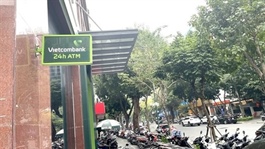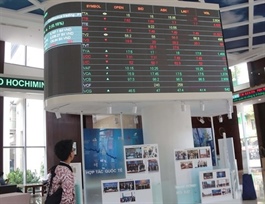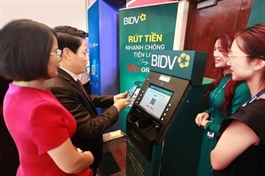Finance ministry clears bottlenecks to pave way for stock market upgrade
Finance ministry clears bottlenecks to pave way for stock market upgrade
One of the key measures is to allow securities companies with sufficient capacity to provide services without requiring foreign investors to have 100% of the funds before placing purchase orders for securities.
The Ministry of Finance (MoF) is seeking opinions on amending several legal provisions to remove various bottlenecks and meet the criteria for stock market upgrades by rating agencies.

Investor at a securities company in Hanoi. Photo: The Hanoi Times |
According to a report from the State Securities Commission of Vietnam (SSC), the country’s stock market regulator, two key areas requiring improvement to attain the upgrading goal include pre-funding and ensuring equitable and timely access to information for foreign investors. These challenges can be tackled through amendments and supplements to pertinent legal documents within the securities sector under the purview of the Government and the MoF.
Addressing the issue of pre-funding requirements
The SSC stated that after consulting international partners and market members, the proposed solution is to allow securities companies with sufficient capacity to provide services without requiring foreign investors to have 100% of the funds before placing buy orders for securities, only requiring them to have sufficient funds before the qualified parties confirm the transaction results and payment obligations with the Vietnam Securities Depository and Clearing Corporation (VSDC). If foreign investors do not have enough funds by the stipulated time, their payment obligation will be transferred to the securities company. However, to ensure feasibility and safety, the regulator proposes to apply this only to groups of investors.
"This solution has received consensus and feasibility assessment from market members, the World Bank, and FTSE Russell," said the SSC.
This is considered to address the biggest obstacles in upgrading Vietnam’s stock market according to the criteria of the FTSE Russell. This solution is also seen as making the trading mechanism of the local stock market similar to that of many others worldwide.
However, to minimize potential risks, the SSC has also proposed some related content regarding this service's user and application targets.
Accordingly, the proposed target group for trading without 100% pre-funding will apply to foreign institutional investors without applying to domestic investors which will ensure fairness because currently, only domestic investors use margin trading services. In contrast, foreign investors are not allowed to borrow money to buy securities.
In addition, there are currently about 7.39 million securities accounts in the market, of which 45,384 accounts belong to foreign investors, including 4,551 accounts of institutional investors. Although the number of institutional investor accounts only makes up 10%, statistics on the Ho Chi Minh City Stock Exchange (HOSE) from 2020 to December 31, 2023, show that their trading value always accounts for over 94% of the total trading value of all foreign investors. Therefore, institutional investors are considered the main group whose obstacles need to be removed for the upgrading of the stock market.
In addition, the service providers are securities companies with good financial status, meeting the conditions for clearing and settlement services, and having sufficient limits to meet the payment for securities transactions of foreign investors using this service in case of their temporary inability to pay.
Furthermore, to reduce risks, the regulatory agency also proposes to add regulations that if securities companies' investments exceed limits due to providing services without pre-funding 100% of foreign investors' funds, they will not continue to provide the aforementioned services until they comply with the investment limits as per current laws.
Promoting use of English in financial documents
A practical survey of the Vietnamese stock market shows that only about 10% of listed companies disclose information and financial reports in English, and most of them are large-cap companies.
Therefore, some believe that requiring bilingual information disclosure will have a significant impact on public companies such as increased costs, increased additional staffing, and difficulty in ensuring accuracy and timeliness, thus affecting the compliance of companies.
Therefore, in this proposal, the regulatory agency proposes to establish a list of public companies that will be required to disclose information in English in the short and long term.
Currently, the number of public companies as of December 31, 2023, is 1,733 companies, including 1,069 large-scale with owner's equity contributions of VND120 billion (US$2.7 million) or more. Therefore, the requirement for English information disclosure will be applied to large-scale public firms for periodic disclosures first. Those with owner's equity contributions below VND 120 billion and irregular information disclosure will be required to do so later, according to the roadmap.
Specifically, it is planned that large-scale listed companies will publish periodic information in English from January 1, 2025, and irregular information, upon request, in English from January 1, 2026. The others will publish periodic information in English from January 1, 2027, and irregular information, upon request, in English from January 1, 2028. Additionally, for stock exchanges, VSDC must also disclose information in both Vietnamese and English.

























